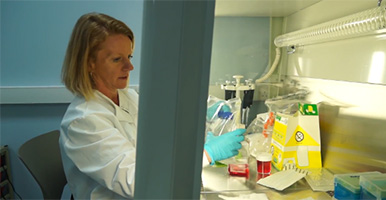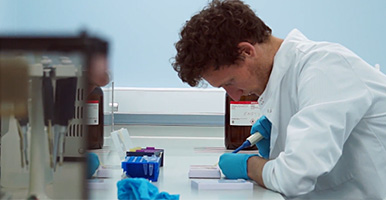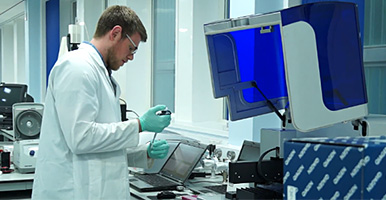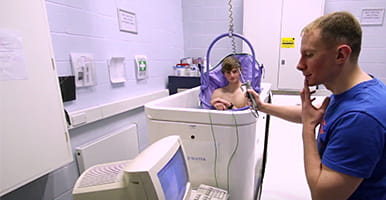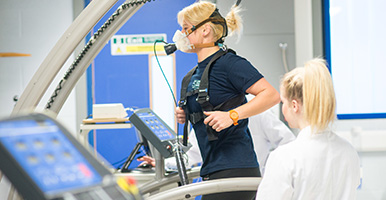Exercise metabolism in health and disease from molecule to man
We are investigating the cellular and molecular adaptations of human and mammalian skeletal muscle to acute and chronic exercise. Our current research also places specific emphasis upon innovative strategies to enhance the adaptive response by employing real world practical interventions prior to, during, or in the recovery period after an exercise session. Many of our exercise studies focus on high-intensity intermittent exercise given the relevance of this type of activity to team sports such as soccer but also because of the potential for this type of activity to improve human health. Measurements at the molecular and cellular level (e.g. qPCR, western blotting, proteomics) are interpreted and complemented by measurement of whole body physiological adaptations (maximal oxygen uptake, muscle function, etc).
Research projects
- High intensity interval training in the management of type 1 diabetes. Applied and fundamental research in collaboration with Dr Rob Andrews (University of Cardiff) and Prof Parth Narendran (University of Birmingham). LJMU research team: Sam Shepherd, Matt Cocks and Anton Wagenmakers
- Adaptations in skeletal muscle lipid metabolism that underlie the beneficial effect of exercise training on insulin resistance (adolescents and adults with obesity and metabolic syndrome) and anabolic resistance (sarcopenia, sedentary elderly). This research project is part of a long-term research collaboration with Astra Zeneca and Professor Jan Borén (University of Göteborg, Muscle Lipidomics). LJMU research team: Juliette Clark, Sam Shepherd and Anton Wagenmakers
- High intensity interval training and timed protein ingestion to prevent the transition from impaired glucose tolerance to type 2 diabetes
We have developed a unique series of confocal immunofluorescence microscopy methods to measure the subcellular distribution in human skeletal muscle of intramuscular triglycerides (lipid droplets), mitochondrial proteins (Cytochrome C oxidase IV; succinate dehydrogenase), GLUT-4, perilipin-2 and -5, HSL, ATGL, CGI58 (co-activator of ATGL), DGAT1, GPAT-1, -2 and -4, focal adhesion kinase, paxillin, muscle capillaries and terminal arterioles, eNOS total and eNOSser1177, several enzymatic and activation subunits of NADPH oxidase in the endothelial layer of muscle microvasculature. These are unique tools to measure insulin resistance at the level of muscle fibers and of the endothelial layers of the skeletal muscle microvasculature (capillaries and arterioles).
We measure ‘whole body’ insulin sensitivity during oral glucose tolerance tests and use a hyperinsulinemic euglycemic clamp in collaboration with Professors Bob Cooper and Mark Gabbay. We can estimate oxidative capacity (VO2max) and perform indirect calorimetry during continuous constant workload cycle ergometry. We can also measure muscle microvascular blood volume and muscle microvascular blood flow velocity by ultrasound techniques. Increases in these variables after meal ingestion and during exercise leads to increases in the surface area available for exchange of glucose, oxygen, amino acids, fatty acids and VLDL-TG lipolysis in the muscle capillary bed.
Professor Jarvis investigates the relationship between ‘dose’ of activity and ‘response’ in muscle and bone cells. He has particular expertise in the use of programmed activation by means of miniature implantable electronic pacers. He also investigates the high resolution structure of muscle, bone and the heart with the new technique of iodine-enhanced micro computed tomography.
Publications
Shepherd SO, Cocks M, Tipton KD, Witard OC, Ranasinghe AM, Barker TA, Wagenmakers AJ, Shaw CS, 2014. Resistance training increases skeletal muscle oxidative capacity and net intramuscular triglyceride breakdown in type I and II fibres of sedentary males. Exp Physiol. 1; 99 (6): 894-908. doi>. Epub 2014 Apr 4. PubMed PMID: 24706192.
Wilson OJ, Bradley H, Shaw CS, Wagenmakers AJ., 2014. Paxillin and focal adhesion kinase colocalise in human skeletal muscle and its associated microvasculature. Histochem Cell Biol. 27. [Epub ahead of print] PubMed PMID: 24671495.
Shepherd SO, Cocks M, Tipton KD, Ranasinghe AM, Barker TA, Burniston JG, Wagenmakers AJ, Shaw CS. 2013. Sprint interval and traditional endurance training increase net intramuscular triglyceride breakdown and expression of perilipin 2 and 5. J Physiol. 1; 591 (Pt 3): 657-75. doi>. Epub 2012 Nov 5. PubMed PMID: 23129790; PubMed Central PMCID: PMC3577544.
Wilson OJ, Shaw CS, Sherlock M, Stewart PM, Wagenmakers AJ, 2012. Immunofluorescent visualisation of focal adhesion kinase in human skeletal muscle and its associated microvasculature. Histochem Cell Biol. 138 (4):617-26. doi>. Epub 2012 Jun 30. PubMed PMID: 22752263.
Wu Y, Collier L, Qin W, Creasey G, Bauman WA, Jarvis J, Cardozo C, 2013. Electrical stimulation modulates Wnt signaling and regulates genes for the motor endplate and calcium binding in muscle of rats with spinal cord transection. BMC Neurosci. 2; 14 (1):81. [Epub ahead of print] PubMed PMID: 23914941; PubMed Central PMCID: PMC3735397.
Al-Shanti N, Durcan P, Al-Dabbagh S, Dimchev GA, Stewart CE, 2014. Activated Lymphocytes Secretome Inhibits Differentiation and Induces Proliferation of C2C12 Myoblasts. Cell Physiol Biochem. 33 (1): 117-28. doi>. Epub 2014 Jan 17. PubMed PMID: 24481011.
Durcan PJ, Al-Shanti N, Stewart CE, 2013. Identification and characterization of novel Kirrel isoform during myogenesis. Physiol Rep. 1 (3): e00044. doi>. Epub 2013 Aug 22. PubMed PMID: 24303129; PubMed Central PMCID: PMC3835000.
Stewart CE. 2013. Immobility and diminished skeletal muscle recovery with age: the sedentary myoblast. J Physiol. 1; 59 1 (Pt 15): 3671-2. doi>. PubMed PMID: 23908407; PubMed Central PMCID: PMC3752445.
People: Professor Anton Wagenmakers, Dr Matt Cocks, Dr Sam Shepherd, Dr Juliette Strauss, Professor Jonathan Jarvis
Stem cells, ageing and molecular physiology unit
Over the last century life expectancy has increased significantly. So much so, in fact, that for the first time in history there are more people alive above retirement age than there are under the age of 16. The fastest growing age group is those aged 80 years and over (approximately 2.7 million in the UK). This figure reflects an increase of over 1.1 million since 1981. This increasing life expectancy brings with it many challenges for biogerontologists, one of which is dealing with the dramatic and often debilitating effects of muscle frailty.
As we age our muscles become smaller and weaker, so that by the age of 70 muscle force can be reduced by approximately 30-40% and reduces our ability to perform everyday tasks. This major loss of muscle force has consequences that we cannot ignore including the increased risk of falling. Between 30 and 50% of people aged 65+ fall at least once each year. Falls are a serious health concern for the elderly and cause pain, disability and even death. Data in the UK over the period 2003-2006 showed that there were more than 475,000 fall events recorded in the 60+ population. Dealing with the consequences of these falls costs the UK government approximately £1 billion per annum; the NHS bears almost 60% of the total cost. Falls bring the risk of hip fracture which has a 6 month mortality rate of 1 in 4 in older populations.
Despite a wealth of research into muscle frailty the basic cellular mechanisms of this decline in function are still poorly understood. Work within EMARG is investigating the role of aberrant reactive oxygen species, insulin resistance, inflammation, reduced anabolism, blunted responses to nutritional stimuli and poor vitamin D status (Dr Graeme Close) on skeletal muscle loss, frailty and compromised repair. Our aim is to discover potential mechanisms to delay the debilitating loss of muscle mass and function seen in older people. This work is in collaboration with Professors John Wilding and Malcolm Jackson, University of Liverpool, Professor Avan Aihie Sayer and Dr Harnish Patel (MRC Lifecourse Epidemiology Unit, University of Southampton) and is funded by Research into Ageing, Astra Zeneca and Sirtris Pharmaceuticals.
In a systems based approach, in vivo physiological studies of muscle wasting are complemented by in vitro studies of skeletal muscle and adipose tissue-derived stem cell adaptation (Prof Claire Stewart and Dr Adam Sharples). This research focuses on the interaction between anabolic and catabolic stimuli, reduced nutrition and altered wound healing capacity. Biochemical and molecular biological analyses of whole blood, tissue and derived cells enable questions to be asked regarding the impact of an intervention at both the local and the whole body level – providing novel data in relation to the ageing process.

Figure 1. Typical CT scan of transverse section of mid-section of thigh from a healthy female in her 20s (top) and a healthy female in her 80s (image courtesy of Professor A Young published in Close et al., 2007, Reviews in Clinical Gerontology).
Stem cells and ageing
We are now able to isolate and characterise stem cells from adipose tissue, cardiac and skeletal muscle and from the circulating blood following damage, exercise, or nutritional interventions in both monolayer cell cultures and 3D bioengineered muscle in-vitro (Prof Stewart and Dr Adam Sharples). We find that the properties of these stem cells are indeed affected by the environment form which they are harvested. Thus in these cells we can investigate the cell cycle (hyperplasia vs hypertrophy), DNA damage and death (apoptosis), adaptation to stress, senescence, wound healing (real time with tracking technologies, Prof Claire Stewart) and ageing (atrophy). We are investigating the role of genomic, epigenetic and transcriptomic regulation of cellular adaptation to begin to address the capacity for humans to adapt to changes in activity, and the limits or malfunction of that capacity in disease states or specific polymorphisms. We use measurements of gene expression (arrays), genotyping (for common genetic variants, or polymorphisms) and DNA methylation (cell memory, Dr Adam Sharples) analyses using HRM qRT-PCR to analyse human biopsy samples from different human populations (for example elite athletes, responders and non-responders to exercise programmes, Dr Rob Erskine).
These cell and molecular investigations are complemented at a whole body level where research activity focuses on the physiological factors underlying the inter-individual variability in the adaptation of skeletal muscle and tendon to exercise, disuse and ageing. To this end, muscle-tendon properties (size, strength, strength, stiffness and quality) are assessed in vivo using ultrasonography, dual-energy X-ray absorptiometry, electrical muscle stimulation and isokinetic dynamometry. From muscle biopsy material, we image muscle fibres using confocal and fluorescence microscopy and perform muscle fibre-typing and protein analyses using SDS-PAGE, Western blotting, ELISA and FLOW cytometric analyses, using Cytometric Bead Arrays, all of which enable the assessment of chronic systemic inflammation on muscle-tendon properties in older and obese populations.
The researchers in this line are therefore applying several current technologies to enable the implementation of systems-based approaches for addressing questions concerned with the regulation of gene expression in relation to nutritional, hormonal, metabolic, pharmacological and physical stimuli which are relevant to exercise, ageing, nutrition, obesity, chronic and acute diseases, wound healing and rehabilitation.

Figure 2. Human skeletal muscle and adipose-derived stem cell cultures.
Publications
Patel HP, Al-Shanti N, Davies LC, Barton SJ, Grounds MD, Tellam RL, Stewart CE, Cooper C , Sayer AA, 2014. Lean Mass, Muscle Strength and Gene Expression in Community Dwelling Older Men: Findings from the Hertfordshire Sarcopenia Study (HSS). Calcified tissue international.
Sharples AP, Hughes DC, Deane CS, Saini A, Selman C, Stewart CE., 2015. Modulating longevity at the expense of skeletal muscle mass: The role of IGF signalling, the Sirtuins, dietary restriction and protein intake. Aging Cell: Accepted.
Cobley JN, Moult PR, Burniston JG, Morton JP, Close GL, 2015. Exercise improves mitochondrial and redox-regulated stress responses in the elderly: better late than never! Biogerontology. 16, 249-264. doi>
Player DJ, Martin NRW, Passey SL, Sharples AP, Mudera V, Lewis MP. 2014. Acute Mechanical Overload Increases IGF-I and MMP-9 mRNA in 3D Tissue Engineered Skeletal Muscle. Biotechnology Letters, 5 (36), 1113-1124. doi> link>
Close GL, Jackson MJ, 2014. Antioxidants and exercise: a tale of the complexities of relating signalling processes to physiological function? J Physiol. 15;592(Pt 8):1721-2. doi>. PubMed PMID: 24737894; PubMed Central PMCID: PMC4001743.
Cobley JN, Sakellariou GK, Owens DJ, Murray S, Waldron S, Gregson W, Fraser WD, Burniston JG, Iwanejko LA, McArdle A, Morton JP, Jackson MJ, Close GL, 2014. Lifelong training preserves some redox-regulated adaptive responses after an acute exercise stimulus in aged human skeletal muscle. Free Radic Biol Med. 2014 May; 70: 23-32. doi>. Epub 2014 Feb 10. PubMed PMID: 24525000.
Cobley JN, Sakellariou GK, Murray S, Waldron S, Gregson W, Burniston JG, Morton JP, Iwanejko LA, Close GL, 2013. Lifelong endurance training attenuates age-related genotoxic stress in human skeletal muscle. Longev Healthspan. 12; 2 (1): 11. doi>. PubMed PMID: 24472304; PubMed Central PMCID: PMC3922955.
Cobley JN, Bartlett JD, Kayani A, Murray SW, Louhelainen J, Donovan T, Waldron S, Gregson W, Burniston JG, Morton JP, Close GL, 2012. PGC-1α transcriptional response and mitochondrial adaptation to acute exercise is maintained in skeletal muscle of sedentary elderly males. Biogerontology. 13 (6): 621-31. doi>. Epub 2012 Nov 15. PubMed PMID: 23187721.
Grosset JF, Breen L, Stewart CE, Burgess KE, Onambélé GL, 2014. Influence of exercise intensity on training-induced tendon mechanical properties changes in older individuals. Age (Dordr). 24. [Epub ahead of print] PubMed PMID: 24760611.
Sharples AP, Player DJ, Martin NR, Mudera V, Stewart CE, Lewis MP, 2012. Modelling in vivo skeletal muscle ageing in vitro using three-dimensional bioengineered constructs. Aging Cell. 11 (6): 986-95. doi>. Epub 2012 Sep 11. PubMed PMID: 22882433.
Saini A, Al-Shanti N, Sharples AP, Stewart CE, 2012. Sirtuin 1 regulates skeletal myoblast survival and enhances differentiation in the presence of resveratrol. Exp Physiol. 97 (3): 400-18. doi>. Epub 2011 Nov 28. PubMed PMID: 22125309.
Sharples AP, Al-Shanti N, Lewis MP, Stewart CE, 2011. Reduction of myoblast differentiation following multiple population doublings in mouse C2 C12 cells: a model to investigate ageing? J Cell Biochem. 112 (12): 3773-85. doi>. PubMed PMID: 21826704.
Al-Shanti N, Durcan P, Al-Dabbagh S, Dimchev GA, Stewart CE., 2014. Activated Lymphocytes Secretome Inhibits Differentiation and Induces Proliferation of C2C12 Myoblasts. Cell Physiol Biochem. 33 (1): 117-28. doi>
Durcan, P., Al-Shanti, N., Stewart, C, 2013. Identification and characterisation of novel Kirrel isoform during myogenesis; Physiological Reports epub. ahead of print. doi>
Tomlinson DJ, Erskine RM, Morse CI, Winwood K, and Onambélé GL, 2014. Combined effects of body composition and ageing on joint torque, muscle activation and co-contraction in sedentary women. AGE. Jun;36 (3): 9652. doi>. Epub 2014 Apr 19.
Stewart, CE 2013. Immobility and diminished skeletal muscle recovery with age: the sedentary myoblast J Physiol 591 (15) 3671-3672. doi>
Barberi L, Scicchitano BM, De Rossi M, Bigot A, Duguez S, Wielgosik A, Stewart C, McPhee J, Conte M, Narici M, Franceschi C, Mouly V, Butler-Browne G, Musarò A., 2013. Age-dependent alteration in muscle regeneration: the critical role of tissue niche. Biogerontology. 14 (3): 273-92. doi>
Deane CS, Hughes DC, Sculthorpe N, Lewis MP, Stewart CE, Sharples AP., 2013. Impaired hypertrophy in myoblasts is improved with testosterone administration. J Steroid Biochem Mol Biol. 25; 138C: 152-161. doi>
Dimchev GA, Al-Shanti N, Stewart CE. 2013. Phospho-tyrosine phosphatase inhibitor Bpv(Hopic) enhances C2C12 myoblast migration in vitro. Requirement of PI3K/AKT and MAPK/ERK pathways. J Muscle Res Cell Motil. 34 (2): 125-36. doi>
Sharples, AP, Al-Shanti, N, Hughes, D, Lewis, M & Stewart, CE, 2013. The role of insulin-like-growth factor binding protein 2 (IGFBP2) and phosphatase and tensin homologue (PTEN) in the regulation of myoblast differentiation and hypertrophy. GH and IGF Research; 23 (3): 53-61. doi>
Erskine RM, Williams AG, Jones DA, Stewart CE, Degens H. 2013. The individual and combined influence of ACE and ACTN3 genotypes on muscle phenotypes before and after strength training. Scand J Med Sci Sports. [Epub ahead of print].
Erskine RM, Williams AG, Jones DA, Stewart CE, Degens H. 2012. Do PTK2 gene polymorphisms contribute to the interindividual variability in muscle strength and the response to resistance training? A preliminary report. J Appl Physiol. 112 (8): 1329-34. doi>
Al-Shanti N, Stewart CE., 2012. Inhibitory effects of IL-6 on IGF-1 activity in skeletal myoblasts could be mediated by the activation of SOCS-3. J Cell Biochem. 113 (3): 923-33. doi>
Patel HP, Jameson, Syddall HE, Martin HJ, Stewart CE, Cooper C, Sayer AA, 2011. Developmental influences, muscle morphology and sarcopenia in community dwelling older men. Journal of Gerontology: Medical Sciences. 67(1):82-7. doi>
Stewart CE and Jones DA, 2012. Myogenesis. Encyclopedia of Exercise Medicine in Health and Disease. Ed: Frank C Mooren, Springer Verlag: 621-624.
Al-Shanti, N, Faulkner, SH, Saini, A, Loram, I and Stewart, CE., 2011. C2 murine myoblast migration following mechanical and chemical damage: development of a semi-automated cell tracking program. Cellular Physiology and Biochemistry 27 (6): 625-36.
Sharples, AP and Stewart, CE, 2011. Myoblast Models of Skeletal Muscle Hypertrophy and Atrophy. Invited review – Current Opinion in Clinical Nutrition and Metabolic Care. 14 (3): 230-6. doi>
Erskine RM, Jones DA, Maffulli N, Williams AG, Stewart CE, Degens H., 2011. What causes in vivo muscle specific tension to increase following resistance training? Exp Physiol. 96 (2): 145-55. doi>
Erskine RM, Jones DA, Williams AG, Stewart CE, Degens H., 2010. Inter-individual variability in the adaptation of human muscle specific tension to progressive resistance training. Eur J Appl Physiol. 110 (6): 1117-25. doi>
Patel HP, Syddall HE, Martin HJ, Cooper, C, Stewart CE, Sayer, AA, 2010. The Feasibility and Acceptability of Muscle Biopsy in Epidemiological Studies: Findings from the Hertfordshire Sarcopenia Study (HSS). J Nutr Health Aging. 1-6.
Atkinson RA, Srinivas-Shankar U, Roberts SA, Connolly MJ, Adams JE, Oldham JA, Wu FC, Seynnes OR, Stewart CE, Maganaris CN, Narici MV. 2010. Effects of Testosterone on Skeletal Muscle Architecture in Intermediate-Frail and Frail Elderly Men. J Gerontol A Biol Sci Med Sci. 65(11): 1215-9. doi>
Patel HP, Syddall HE, Martin HJ, Stewart CE, Cooper C, Aihie Sayer A. 2010. Hertfordshire Sarcopenia Study: design and methods. BMC Geriatr. 29; 10 (1):43. doi>
Stewart CE, Pell JM. 2010. Last Word on Point: Counterpoint: IGF is the major physiological regulator of muscle mass. J Appl Physiol. 108 (6): 1832.
Sharples AP, Al-Shanti N, Stewart CE. 2010. C(2) and C(2)C(12) Murine Skeletal Myoblast Models of Atrophic and Hypertrophic Potential: Relevance to Disease and Ageing? J Cell Physiol 225 (1): 240-50. doi>
Onambele-Pearson GL, Breen L, Stewart CE., 2010. Influence of exercise intensity in older persons with unchanged habitual nutritional intake: skeletal muscle and endocrine adaptations. Age (Dordr). 32 (2): 139-53. doi.
Erskine RM, Jones DA, Williams AG, Stewart CE, Degens H. 2010. Resistance training increases in vivo quadriceps femoris muscle specific tension in young men. Acta Physiol (Oxf); 199 (1): 83-9. doi>
Stewart CE, Pell JM. 2010. Point: IGF is the major physiological regulator of muscle mass. J Appl Physiol. 108 (6): 1820-1.
Saini A, Al-Shanti N, Stewart CE., 2010. C2 skeletal myoblast survival, death, proliferation and differentiation: regulation by Adra1d. Cell Physiol Biochem. 25 (2-3): 253-62. doi>
People: Prof Claire Stewart, Dr Adam Sharples, Dr Graeme Close, Dr James Morton, Dr Rob Erskine
Nutrition and supplementation
The field of sport and exercise nutrition has played a significant role in the ethos and development of research within the Research Institute for Sport and Exercise Sciences (RISES) over the years. Earlier and continued research has focused on the applied aspects of nutritional intervention strategies and sporting scenarios, although some recent developments have also targeted examination of mechanisms. The use of nutritional ergogenic aids such as caffeine, alkalinisers and alcohol have been explored in various settings with resultant peer reviewed publications. Interdisciplinary work with colleagues researching in circadian rhythms (shift work and feeding strategies) and psychology (effects of carbohydrate on cognitive function during sport and exercise) have been particularly fruitful in terms of research outputs.
Significant funding has been attained over the years from Masterfoods (1 PhD studentship examining fat feeding and the metabolic and performance responses during exercise), Glaxo SmithKline (2 PhD studentships – one concerned with nutritional strategies and hill-walking, and the other on carbohydrate feeding and simulated soccer activity), Red Bull UK (1 PhD studentship exploring the efficacy of a caffeinated drink on aspects of performance and metabolism) and Novartis. In addition, local companies have worked with us in contract research to develop nutritional products for health and fitness.
Extensive laboratory facilities have enabled research employing hyperinsulinaemic and hyperglycaemic clamp techniques, human muscle biopsy techniques, full scale analyses of blood metabolites and hormones, and (more recently) the use of proteomics and pathways for cell signalling molecule determinations. These techniques have been employed in understanding the impact of several pharmaceutical agents used in HIV treatment and their effect on insulin resistance.
Current investigations include training with a low carbohydrate status and the effect on muscle enzymes and heat shock proteins, the effect of low and high GI meals on metabolism and sport performance and muscle signalling, the effect of maintained hyperglycaemia on the metabolic responses to steady state cycling in elderly and young participants, and the effects of caffeine on metabolism and performance.
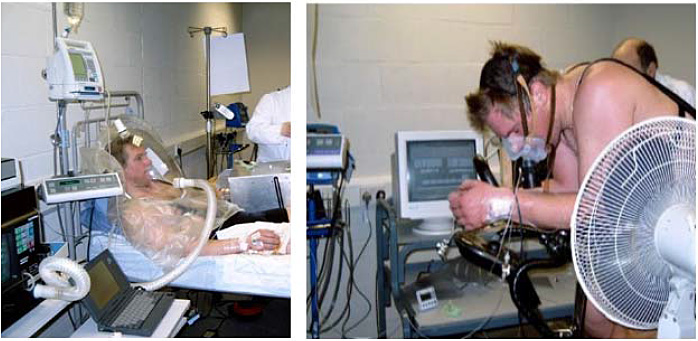
Figure 3. Typical metabolic clamp procedure during rest and exercise.
We investigate dietary supplementation with flavonoids which have the potential to enhance muscle oxidative capacity and microvascular density and to improve insulin sensitivity in health and disease and in sedentary individuals.
The group’s research work concerned with pharmaceuticals spans both performance and health. Much of the work addressing the performance aspects of pharmaceutical use has related to anti-doping strategies in elite sport. Indeed, collaboration and support has come from both national and international anti-doping organisations (UKAD and WADA). We have also examined the use of over-the-counter stimulants encompassing their pharmacokinetics, physiological and reputed performance-enhancing impact to inform anti-doping policy. Current work, also supported by WADA, in collaboration with Prof Greg Whyte and Dr John Dickinson is examining the pharmacokinetics and potential ergogenic properties of short acting β2-agonists.
An important area of current research within the group is to examine the impact of performance and image enhancing drug use from a public health perspective. Case controlled work (funded by the Institute for Health Research) in collaboration with Jim McVeigh and Michael Evans-Brown (Centre for Public Health) and RISES (Profs Keith George and Greg Whyte) is investigating the effects of long-term use of anabolic androgenic steroids (AAS) upon cardiovascular and metabolic health. Further work in collaboration with Jim McVeigh and Michael Evans-Brown (Centre for Public Health) and with Dr Andrew Kicman (Drug Control Centre, King’s College London) is examining the public health issues surrounding the availability and authenticity of sports supplements containing AAS and testosterone precursors (Figure 4).
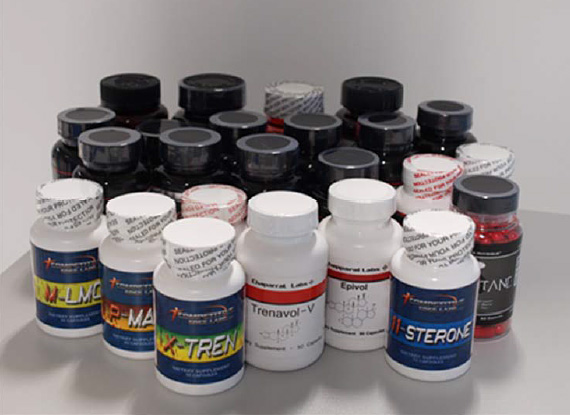
Figure 4. Supplements available over-the-counter and from the Internet
Case study
A successful diet intervention study carried out within the Group has made a positive impact on the health and wellbeing of jockeys. Not only has it influenced change within the culture of horseracing, the media interest in the study has helped raise awareness of the weight-making issue.
Read the case study: Promoting wellbeing in professional jockeys
Publications
Dickinson J, Hu J, Chester N, Loosemore M, Whyte G., 2014. Acute impact of inhaled short acting b2-agonists on 5 km running performance. J Sports Sci Med. 1; 13 (2): 271-9. eCollection 2014 May. PubMed PMID: 24790479; PubMed Central PMCID: PMC3990879.
Dickinson J, Hu J, Chester N, Loosemore M, Whyte G, 2014. Impact of Ethnicity, Gender, and Dehydration on the Urinary Excretion of Inhaled Salbutamol With Respect to Doping Control. Clin J Sport Med. 10. [Epub ahead of print] PubMed PMID: 24518370.
Dickinson J, Molphy J, Chester N, Loosemore M, Whyte G, 2014. The Ergogenic Effect of Long-term Use of High Dose Salbutamol. Clin J Sport Med. 21. [Epub ahead of print] PubMed PMID: 24451697.
Molphy J, Dickinson J, Hu J, Chester N, Whyte G, 2013. Prevalence of bronchoconstriction induced by eucapnic voluntary hyperpnoea in recreationally active individuals. J Asthma; 51 (1): 44-50. doi>. Epub 2013 Oct 16. PubMed PMID: 23987567.
Angell PJ, Chester N, Sculthorpe N, Whyte G, George K, Somauroo J., 2012. Performance enhancing drug abuse and cardiovascular risk in athletes: implications for the clinician. Br J Sports Med. 46 Suppl 1:i78-84. doi>. Review. PubMed PMID: 23097484.
Wilson G, Chester N, Eubank M, Crighton B, Drust B, Morton JP, Close GL, 2012. An alternate dietary strategy to make weight improves mood, decreases body fat and removes the necessity for dehydration: A case-study from a professional jockey. Int J Sport Nutr Exerc Metab. 15. [Epub ahead of print] PubMed PMID: 22710736.
Angell PJ, Chester N, Green DJ, Shah R, Somauroo J, Whyte G, George K, 2012. Anabolic steroid use and longitudinal, radial, and circumferential cardiac motion. Med Sci Sports Exerc. 44 (4): 583-90. doi: 10.1249/MSS.0b013e3182358cb0. PubMed PMID: 21900841.
Marrin K, Drust B, Gregson W, Morris CJ, Chester N, Atkinson G, 2011. Diurnal variation in the salivary melatonin responses to exercise: relation to exercise-mediated tachycardia. Eur J Appl Physiol. 111 (11): 2707-14. doi>. Epub 2011 Mar 12. PubMed PMID: 21399961.
People: Dr Graeme Close, Dr James Morton, Dr Dominic Doran, Dr Neil Chester, Dr Keith George
Performance and applied sport science
We have experience of applied sport science research at the highest sporting levels. For example, Professor Barry Drust is the Sport Scientist for the England mens’ football team, serving at the Brazil 2014 World Cup competition. Professor Greg Whyte OBE has coached and advised many celebrity challenges as part of the Sport and Comic Relief fundraising ventures. This activity reflects an important component of the research activity of EMARG. These projects represent the ability of group members to (a) apply theoretical concepts related to high performance to athlete populations and/or (b) investigate applied research questions of practical relevance to sports performance and/or training. Team sports (e.g. soccer and rugby) represent the specific focus of this work, and the more general theme of intermittent exercise also guides projects. Investigations into the demands placed on professional jockeys as well as athletes who compete in combat sports are also important to this area. Collaborative relationships with professional sports organisations (e.g. Liverpool FC, Manchester United FC, The Football Association, The Qatari FA, Munster FC) as well as commercial companies (Prozone, SIS, Nike) frequently provide the platform for the delivery of these research projects.
Publications
Wilson, G., Hawken, M. B., Poole, I., Drust, B., Sparks, A., Bennett, S., Morton, J.P. and Close, G. L. 2014. Rapid weight-loss impairs simulated riding performance and strength in jockeys: implications for making-weight. Journal of Sports Sciences, 32 (4), 383-391. doi>
Bridge, C. A., McNaughton, L. R., Close, G. L., and Drust, B. 2013. Taekwondo exercise protocols do not recreate the physiological responses of championship combat. International Journal of Sports Medicine, 34 (7), 573-581. doi>
Bartlett, J. D., Louhelainen, J., Iqbal, Z., Cochran, A. J., Gibala, M. J., Gregson, W., Drust, B. and Morton, J. P. 2013. Reduced carbohydrate availability enhances exercise-induced p53 signaling in human skeletal muscle: implications for mitochondrial biogenesis. Am J Physiol Regul Integr Comp Physiol, 304 (6), R450-R458. doi>
Wrigley, R., Drust, B., Stratton, G., Scott, M., and Gregson, W., 2012. Quantification of the typical weekly in-season training load in elite junior soccer players. J Sports Sci, 30 (15), 1573-1580. doi>
Kelly, D. M., Gregson, W., Reilly, T., and Drust, B.,2013. The development of a soccer specific training drill for elite-level players. J Strength Cond Res, 27 (4), 938-943. doi>
Gaudino P, Iaia FM, Alberti G, Strudwick AJ, Atkinson G, Gregson W. Monitoring Training in Elite Soccer Players: Systematic Bias between Running Speed and Metabolic Power Data. International Journal of Sports Medicine, 34 (11): 963-968
People: Professor Barry Drust, Dr Andrew Hulton, Dr James Morton, Dr Graeme Close, Professor Warren Gregson
Proteomics
The proteins that are expressed within a cell (i.e. its proteome) characterise that cell and dictate its functional characteristics. For example, muscle cells express a variety of myofibrillar proteins that enable them to contract and produce force. The proteome is the interface between the genome and environment, and the interaction between an individual’s genetic heritage and environmental factors (e.g. activity and dietary habits) determines their peak physical capacity and susceptibility to disease. Proteomic techniques afford comprehensive analysis of such interactions and can discover new information concerning exercise-induced adaptation in an efficient manner.
The proteomics laboratory is equipped with state-of-the-art instruments and work at LJMU has pioneered the application of proteomic techniques in the field of exercise physiology, including two-dimensional electrophoresis and mass spectrometry of muscle samples. The laboratory benefits from a portfolio of local, national and international collaborations that support projects aimed at establishing new analytical techniques and developing understanding the health benefits of exercise. Research conducted in the proteomics laboratory has been supported by: charities, including The Royal Society and The British Heart Foundation; local NHS Trusts and The Institute for Health Research (LJMU).
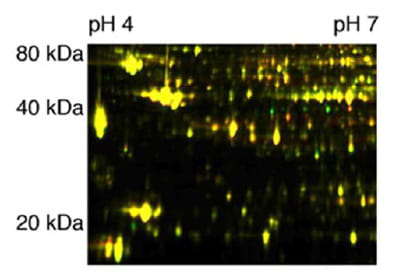
Figure 5. Proteomic investigations of skeletal muscle adaptations to exercise.
Publications
Malik ZA, Cobley JN, Morton JP, Close GL, Edwards BJ, Koch LG, Britton SL, Burniston JG, 2013. Label-Free LC-MS Profiling of Skeletal Muscle Reveals Heart-Type Fatty Acid Binding Protein as a Candidate Biomarker of Aerobic Capacity. Proteomes. 1;1 (3): 290-308. PubMed PMID: 24772389; PubMed Central PMCID: PMC3997170.
Burniston JG, Kenyani J, Gray D, Guadagnin E, Jarman IH, Cobley JN, Cuthbertson DJ, Chen YW, Wastling JM, Lisboa PJ, Koch LG, Britton SL, 2014. Conditional independence mapping of DIGE data reveals PDIA3 protein species as key nodes associated with muscle aerobic capacity. J Proteomics. 24; 106C: 230-245. doi>. [Epub ahead of print] PubMed PMID: 24769234.
Cobley JN, Sakellariou GK, Murray S, Waldron S, Gregson W, Burniston JG, Morton JP, Iwanejko LA, Close GL, 2013. Lifelong endurance training attenuates age-related genotoxic stress in human skeletal muscle. Longev Healthspan. 12; 2 (1): 11. doi>. PubMed PMID: 24472304; PubMed Central PMCID: PMC3922955.
Burniston JG, Meek TH, Pandey SN, Broitman-Maduro G, Maduro MF, Bronikowski AM, Garland T Jr, Chen YW, 2013. Gene expression profiling of gastrocnemius of "minimuscle" mice. Physiol Genomics. 18; 45 (6): 228-36. doi>. Epub 2013 Jan 29. PubMed PMID: 23362141; PubMed Central PMCID: PMC3615581.
Shepherd SO, Cocks M, Tipton KD, Ranasinghe AM, Barker TA, Burniston JG, Wagenmakers AJ, Shaw CS, 2012. Preferential utilization of perilipin 2-associated intramuscular triglycerides during 1 h of moderate-intensity endurance-type exercise. Exp Physiol. 97 (8): 970-80. doi>. Epub 2012 Apr 11. PubMed PMID: 22496505.
Burniston JG, Kenyani J, Wastling JM, Burant CF, Qi NR, Koch LG, Britton SL, 2011. Proteomic analysis reveals perturbed energy metabolism and elevated oxidative stress in hearts of rats with inborn low aerobic capacity. Proteomics. 11 (16):3369-79. doi>. PubMed PMID: 21751351; PubMed Central PMCID: PMC3319703.
Burniston JG, Hoffman EP. 2011. Proteomic responses of skeletal and cardiac muscle to exercise. Expert Rev Proteomics. 8 (3): 361-77. doi>. Review. PubMed PMID: 21679117.
People: Dr Jatin Burniston, Professor Jonathan Jarvis
Genetic variation and musculoskeletal physiology
Sport and exercise genomics has become a very hot topic in the last 10-15 years. Traditionally, chronic exercise studies have focused on the average response to training, while the variability between participants was assumed to be experimental error associated with the measurements, or variation in the commitment of the participants. More recently, however, research including work from EMARG has revealed that the variable training response is a real phenomenon and that a better understanding of this variability among individuals may provide insight into the mechanisms controlling muscle growth, changes in strength or changes in endurance of skeletal muscle. In addition, there could be practical benefits in knowing who might or might not respond to a specific programme of exercise, since training is an important aspect of sport and rehabilitation. Consequently, there is considerable interest in determining whether variants of candidate genes (called polymorphisms) are associated with the way in which human muscle and tendon adapt to different types of exercise training, and with susceptibility to injury.
For a genetic study to provide meaningful information, it is vital that the phenotype is accurately characterised. For this purpose we use state-of-the-art equipment, including ultrasonography, isokinetic dynamometry, dual-energy X-ray absorptiometry, neuromuscular electrical stimulation and EMG to measure muscle and tendon size, architecture (Fig. 6), muscle strength and neuromuscular activation and fatigue. In addition to identifying genetic associations with skeletal muscle-tendon properties in young and older populations, our strong links with professional athlete groups enable us to explore genetic associations with the elite extreme on the spectrum of human performance.
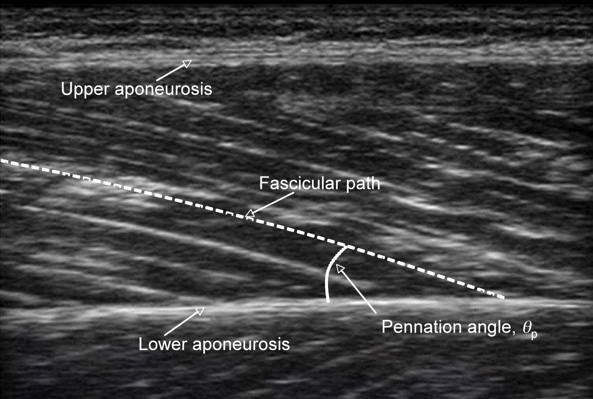
Figure 6. A representative ultrasound image of the human vastus lateralis muscle architecture during maximum voluntary muscle contraction. The fascicular path, the fascicle pennation angle (the angle at which the fascicles insert into the aponeurosis) and the upper and lower aponeuroses are highlighted (from Erskine et al., 2009).
Publications
Erskine RM, Williams AG, Jones DA, Stewart CE and Degens H. Individual and combined influence of ACE and ACTN3 genotypes on muscle phenotypes before and after strength training. Scand J Med Sci Sports In Press. doi>
Tomlinson DJ, Erskine RM, Morse CI, Winwood K, and Onambélé GL, 2014. Combined effects of body composition and ageing on joint torque, muscle activation and co-contraction in sedentary women. AGE. In Press doi>
Heffernan S, Kilduff LP, Erskine RM, Day SH, McMahon GE, Cook CJ, Vance B, Wang G, Collins M, Pitsiladis YP and Williams AG, 2013. ACE and ACTN3 gene variants are associated with elite status and playing position in rugby union. Proc BASES Annual Conference (Lancashire, UK).
Erskine RM, Williams AG, Jones DA, Stewart CE and Degens H, 2012. Do PTK2 gene polymorphisms contribute to the interindividual variability in muscle strength and the response to resistance training? A preliminary study. J Appl Physiol 112 (8): 1329-34. doi>
Stewart CE, Rittweger J, 2006. Adaptive processes in skeletal muscle: Molecular regulators and genetic influences. J Musculoskelet Neuronal Interact 6 (1): 73-86.
Erskine RM, Morse CI, Day SH, Williams AG and Onambele-Pearson GL. Comparing DXA and MRI measurements of the patellar tendon moment arm in vivo. J Biomech 47 (6): 1294-8.
Erskine RM, Fletcher G and Folland JP. The contribution of muscle hypertrophy to strength changes following resistance training. Eur J Appl Physiol In Press. doi>
Erskine RM, Jones DA, Maffulli N, Williams AG, Stewart CE and Degens H, 2011. What causes in vivo muscle specific tension to increase following resistance training? Exp Physiol 96 (2): 145-55. doi>
Erskine RM, Jones DA, Williams AG, Stewart CE and Degens H, 2010. Inter-individual variability in the adaptation of human muscle specific tension to progressive resistance training. Eur J Appl Physiol 110 (6): 1117-25. doi>
Erskine RM, Jones DA, Williams AG, Stewart CE and Degens H, 2010. Resistance training increases in vivo quadriceps femoris muscle specific tension in young men. Acta Physiol (Oxf) 199 (1): 83-9. doi>
Degens H, Erskine RM, Morse CI, 2009. Disproportionate changes in skeletal muscle strength and size with resistance training and ageing. J Musculoskelet Neuronal Interact 9 (3): 123-9.
Seynnes OR, Erskine RM, Maganaris CN, Longo S, Simoneau EM, Grosset JF and Narici MV, 2009. Training-induced changes in structural and mechanical properties of the patellar tendon are related to muscle hypertrophy but not to strength gains. J Appl Physiol 107 (2): 523-30. doi>
Erskine RM, Jones DA, Maganaris CN and Degens H, 2009. In vivo specific tension of the human quadriceps femoris muscle. Eur J Appl Physiol 106 (6): 827-38. doi>
People: Dr Robert Erskine, Professor Claire Stewart, Professor Constantinos Maganaris


